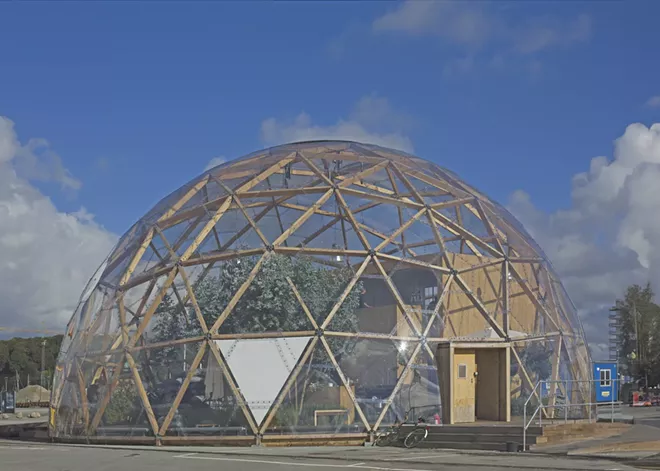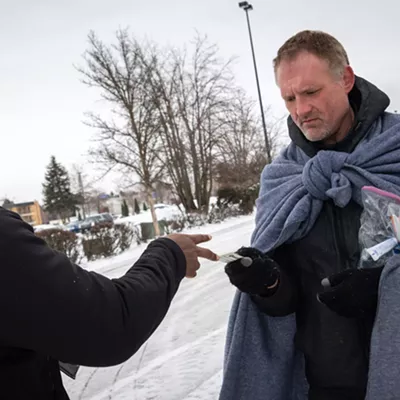
Spokane Public Library continues to adopt the most innovative ideas for what a library can be, with the latest plan bringing forward a unique partnership that's set to build library amenities alongside apartments for refugees in Spokane.
Starting later this year, Thrive International will begin building 45 to 55 apartments in the Shiloh Hills neighborhood on a vacant piece of property the library has owned since the 1990s.
As a nonprofit, Thrive helps refugees relocate and become part of the community. Half of the new apartments will be designated for refugees at affordable housing rates, while the other half will be rented out at market rates to help create a sense of community.
In addition to housing, there will be a public event space operated by the library that the public can rent out for free, and a 24/7 library kiosk. Outside, visitors will find a playground and a geodesic dome classroom space inspired by a project in Denmark. Community members will be able to learn how to garden in a greenhouse setting and take other creative classes from the library's staff and partners.
Libraries in cities like Chicago and New York have built similar public-private partnership apartment projects, but this will be the first known project specifically intended to help refugees.
Thrive currently offers temporary housing for refugees out of a former hotel in downtown. Knowing they wanted to offer the next step in stability and independence, the nonprofit started looking for vacant real estate to build on, which led them to ask the city if there were any potential properties, says Thrive Executive Director Mark Finney.
The city pointed the nonprofit to the library system. Over the years, Spokane Public Library had tried to sell the Nevada Street land, but nothing could be built over a sewer line that runs through the middle of the site, says Caris O'Malley, deputy director for Spokane Public Library.
"We've had several sales that were posted that didn't go through for various reasons," O'Malley says.
In soliciting community feedback for the library's 2018 bond, the library system identified 24/7 kiosks as an important way to expand book access throughout the city. But they had struggled to find a good place in that area to put one where people would be drawn to use it, O'Malley says. Just as the library started to design an indoor community gardening space that could bring people to the Nevada Street location, Thrive reached out, and the plans clicked into place.
"We realized that we had some mission alignment," O'Malley says. "Libraries aren't trying to solve housing problems. Libraries aren't trying to provide indoor play spaces for children or meeting rooms. But we know those are all needs in Spokane, so when we take efforts to move the needle on those, we end up moving the needle in the library world, too, and catch a lot of attention that way."
In March, the library board agreed to sell the land to Thrive for $10. The libraries in turn will pay $10 per year on a 50-year lease to continue using the public event room in the apartments, and a 50-year easement will maintain library access to the gardening and classroom spaces on site, O'Malley says.
Thrive is working with private investors to push their project along quickly (rather than waiting for federal or state resources), and their team was able to see past the site restrictions and design multiple apartment buildings with a parking lot that's allowed over the utility line.
"Our process is unique, using social impact investors as opposed to the traditional government-funded approaches," Finney says. "Part of our broader vision is to create environments where people can quickly move from surviving to thriving."
Whereas Thrive hopes refugees spend maybe six to nine months stabilizing, finding work and getting accustomed to the cultural differences while staying at the hotel space downtown, the goal for the new apartments is to offer a more independent housing environment for two to five years, as they work toward citizenship and potentially homeownership, Finney says.
"It's kind of like the difference between a skilled nursing facility and independent living," Finney says. "The staff is more hands-on in one place, and in the second place you're more independent, but the resources are still there for you to access."
The project is the latest cutting edge service expansion for Spokane's libraries, which in recent years also started offering things like studio recording spaces and room for artist residencies. There will always be books in the library's offerings, but the common thread among the many expanded services is community connection, says Amanda Donovan, director of marketing and communications for Spokane Public Library.
"If I was going to predict the future, we'd be looking for more ways to create connections within the community, opportunities to be together, to connect with resources that you might not be able to afford on your own," Donovan says. "That's really where I think we're headed as libraries. Less a place for quiet studying, which of course that's still available, and more a place to connect, learn and grow as a community." ♦
Editor's Note: This story was updated on Friday, April 5, 2024, to correct the name of the neighborhood where the project is planned.























